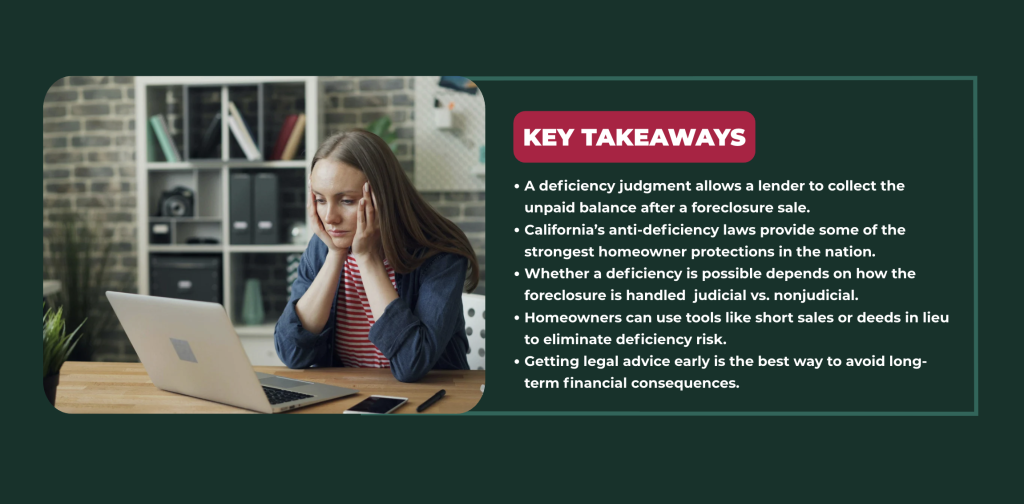When your home sells for less than what you owe, the debt doesn’t always disappear. In some cases, lenders try to collect the difference through a deficiency judgment.
At ACE California Law, our mission is simple to protect your property, your peace of mind, and your future. Our California real estate attorneys bring decades of combined experience representing homeowners across the state. In this article, we’ll explain how deficiency judgments work, how California law shields most homeowners, and what you can do to protect yourself.
What Is a Deficiency Judgment?
A deficiency judgment is a court order that lets a lender recover the remaining loan balance after the foreclosure sale of a property fails to fully pay off the mortgage. Not every state allows this, but California’s anti-deficiency statutes make it extremely difficult for lenders to collect these debts especially after residential foreclosures.

How a Deficiency Judgment Works
A deficiency judgment doesn’t happen automatically. It requires a judicial foreclosure, meaning the lender must go through court rather than the faster nonjudicial process most commonly used in California.
Here’s how it works:
- The lender files a lawsuit and shows the unpaid balance after the foreclosure sale.
- The court reviews the evidence and determines the fair market value of the property (under CCP §726(b)).
- If approved, the court issues a deficiency judgment for the difference between the loan balance and the fair market value.
Once entered, lenders can use aggressive collection methods such as:
- Wage garnishment: a portion of your paycheck goes directly to the lender.
- Bank levies: funds are seized from your bank accounts.
- Judgment liens: recorded against your other real estate.
Fortunately, under California Code of Civil Procedure §580d, deficiency judgments are barred after most nonjudicial foreclosures which covers the majority of residential cases in the state.
How a Deficiency Judgment Is Pursued
The path typically follows these steps:
- The lender completes a foreclosure sale and calculates any remaining balance.
- The lender files a lawsuit asking the court for a deficiency judgment.
- A hearing determines the property’s fair market value to prevent inflated amounts.
- If approved, collection efforts (garnishment, liens, levies) may begin.
Because judicial foreclosures are slow and expensive, most lenders avoid them. Even when they do proceed, borrowers have several defenses, including:
- Challenging loan accounting or the amount claimed
- Disputing the property’s appraised value
- Raising procedural or notice-related errors
These defenses can significantly reduce or even eliminate a lender’s claim.
California’s Anti-Deficiency Protections
California provides some of the strongest protections for homeowners in the country. The state’s public policy favors giving families a financial fresh start after foreclosure.
Key laws include:
- CCP §580d: Bars deficiency judgments after nonjudicial foreclosure sales.
- CCP §580b: Prohibits deficiency judgments on purchase money loans for owner-occupied 1–4 unit residential properties.
- CCP §580e: Prevents lenders from seeking deficiencies after approving short sales.
- Deeds in Lieu: When a homeowner voluntarily transfers the property to the lender, the debt is usually considered fully satisfied.
Exceptions: Lenders can still pursue claims for fraud or property waste, but these are rare and difficult to prove.
The One-Action Rule and Security-First Rule
Two key doctrines further protect California borrowers:
- One-Action Rule (CCP §726):
A lender can take only one legal action to recover a mortgage debt — either foreclose or sue directly, not both. - Security-First Rule:
The lender must first look to the property (the “security”) for repayment before pursuing personal collection.
Together, these rules prevent lenders from “double dipping” ensuring the foreclosure sale is the final remedy in most cases.
Legal Strategies to Avoid a Deficiency Judgment
If you’re facing foreclosure, you have options to limit or eliminate deficiency exposure:
- Short Sale with Full Release
Under CCP §580e, once your lender approves a short sale, they cannot later pursue the unpaid balance. Always get the release in writing. - Deed in Lieu of Foreclosure
Transferring the property back to the lender can satisfy the debt entirely — just confirm in writing that you’re released from liability. - Loan Modification or Forbearance
Negotiating new payment terms can stop foreclosure and avoid any deficiency risk. - Fair Value Hearing in Judicial Foreclosures
Challenge any undervaluation of your property to reduce the deficiency amount. - Bankruptcy Protection
If a deficiency judgment already exists, bankruptcy can discharge or restructure the debt.
Acting early gives you the most leverage. Once a foreclosure process starts, time and options narrow quickly.
Short Sales and Deeds in Lieu: Two Key Tools
Both options help California homeowners walk away without lingering debt.
Short Sale (CCP §580e)
You sell the property for less than the mortgage balance, and the lender agrees to accept the proceeds as full payment. The lender cannot later sue you for the difference.
Deed in Lieu of Foreclosure
You voluntarily transfer ownership to the lender in exchange for full forgiveness of the debt. This option avoids foreclosure and credit damage, but should always include a written waiver of liability.
Advantages:
- Prevents deficiency liability
- Avoids court and legal fees
- Minimizes credit impact
- May qualify you for relocation assistance
When to Seek Legal Guidance
The sooner you contact an attorney, the better your chances to protect your finances. A real estate attorney can:
- Review foreclosure notices for errors
- Verify compliance with California’s Homeowner Bill of Rights
- Defend against dual tracking or improper lender conduct
- Ensure short sale or deed-in-lieu agreements include full release language
If you’ve received a Notice of Default or believe your lender might pursue a deficiency, don’t wait. Early intervention can make the difference between resolution and long-term debt.
Knowledge Is Protection
Understanding how deficiency judgments work empowers homeowners to make informed decisions and safeguard their financial future.
California’s laws strongly favor borrowers — but those protections only work if you use them. Whether through a short sale, deed in lieu, or skilled legal defense, you can stop a deficiency before it starts.
If you’re facing foreclosure or suspect your lender may seek additional payment, we can help. Call ACE California Law today at (833) 342-2323 or visit our contact us page to schedule a consultation. Protect your property. Protect your peace of mind. Protect your future.






